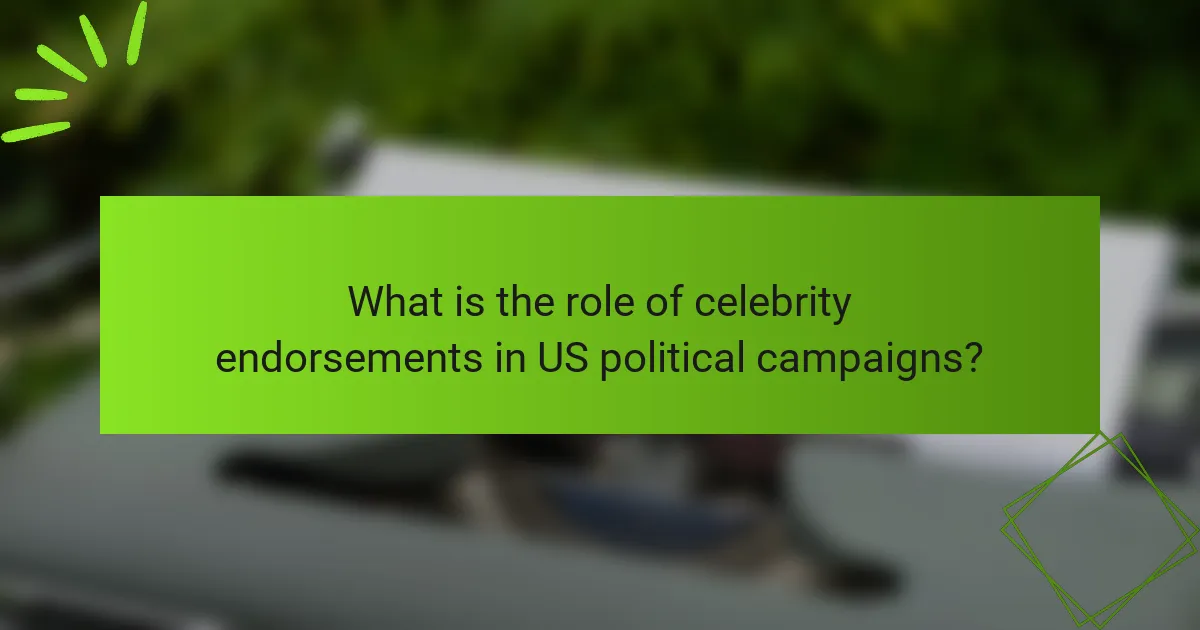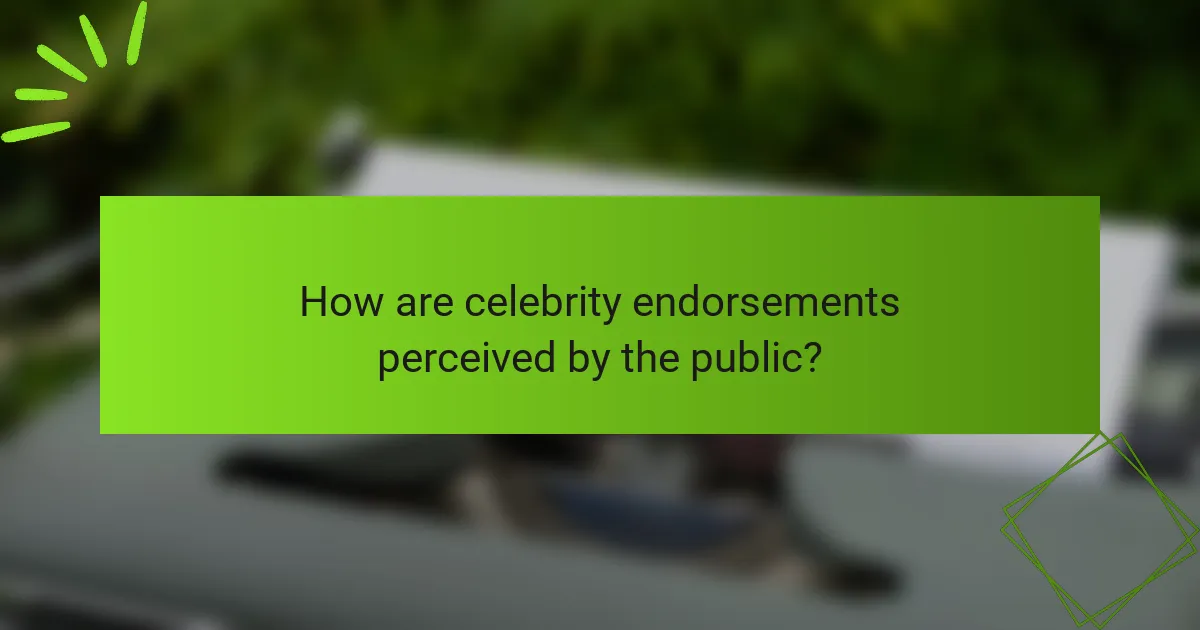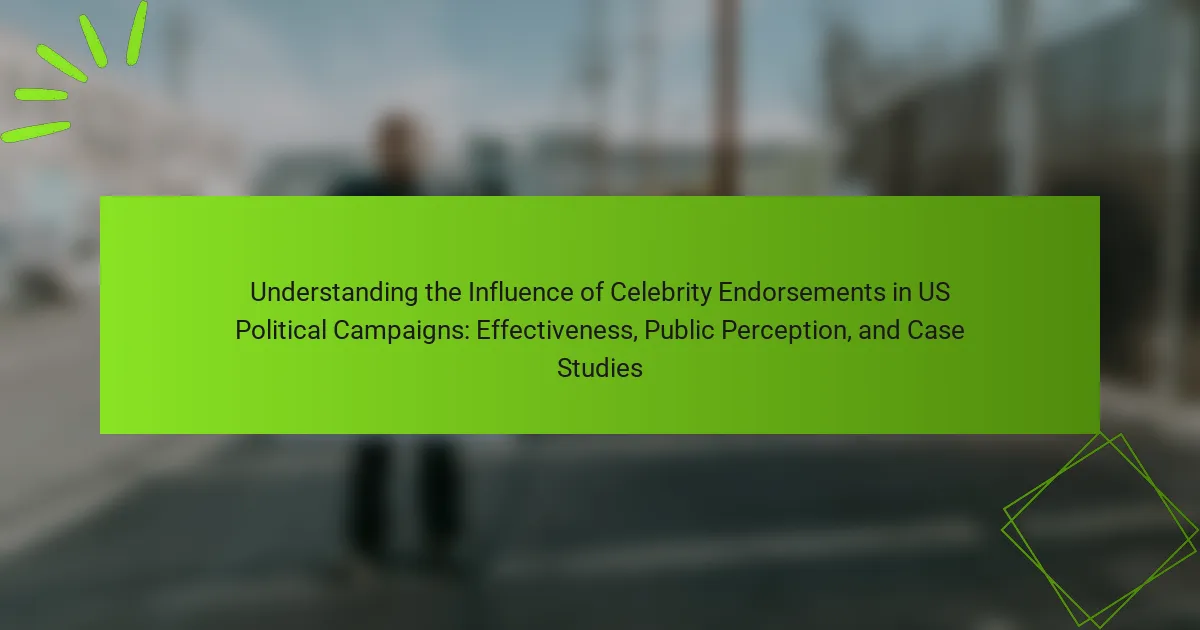Celebrity endorsements significantly impact US political campaigns by enhancing candidate visibility and appealing to voters, particularly younger demographics. Research shows that these endorsements can sway public opinion and increase voter turnout, with studies indicating a favorability boost of up to 10% for endorsed candidates. The presence of celebrities often brings substantial social media followings, amplifying campaign messages and fostering a sense of authenticity. Notable examples include Barack Obama’s 2008 campaign and Ronald Reagan’s 1980 election, illustrating how celebrity support translates into increased media coverage and voter engagement. Additionally, public perception of celebrity endorsements is generally positive, although effectiveness can vary based on the celebrity’s relevance and authenticity.

What is the role of celebrity endorsements in US political campaigns?
Celebrity endorsements play a significant role in US political campaigns by enhancing candidate visibility and appeal. They attract media attention and engage younger voters who may be less informed. Research indicates that endorsements can sway public opinion and increase voter turnout. For instance, a study by the University of California, Los Angeles found that celebrity endorsements can boost a candidate’s favorability by up to 10%. Additionally, celebrities often bring their large social media followings, amplifying campaign messages. This influence can create a sense of authenticity and relatability for candidates. Overall, celebrity endorsements serve as a strategic tool in shaping political narratives and mobilizing support.
How do celebrity endorsements influence voter behavior?
Celebrity endorsements significantly influence voter behavior by increasing awareness and shaping public perception. When celebrities endorse a candidate, they attract media attention and boost visibility. This can lead to higher voter engagement, particularly among younger demographics. Studies show that celebrity endorsements can sway undecided voters. For instance, a study published in the Journal of Political Marketing found that celebrity endorsements increased candidate favorability by 20%. Additionally, endorsements can enhance the perceived credibility of a candidate. This effect is particularly strong when the celebrity aligns with the candidate’s values. Overall, celebrity endorsements serve as a powerful tool in political campaigns, impacting voter decisions and shaping electoral outcomes.
What psychological mechanisms are at play in celebrity endorsements?
Celebrity endorsements leverage several psychological mechanisms to influence consumer behavior. The principle of social proof suggests that individuals are more likely to adopt behaviors endorsed by popular figures. This is supported by the phenomenon of identification, where consumers relate to celebrities and aspire to emulate them. Additionally, the halo effect plays a crucial role; positive attributes of the celebrity transfer to the product. Research indicates that endorsements can enhance brand credibility and trustworthiness. Studies show that consumers are more likely to purchase products endorsed by celebrities they admire. Emotional appeal is also significant, as celebrities evoke feelings that can enhance brand attachment. Overall, these mechanisms create a persuasive environment for consumers.
How do demographics affect the impact of celebrity endorsements?
Demographics significantly affect the impact of celebrity endorsements. Different age groups respond uniquely to celebrity influence. Younger audiences often idolize celebrities, leading to higher engagement and trust. In contrast, older demographics may prioritize credibility over celebrity status. Gender also plays a role; women may resonate more with endorsements from female celebrities. Cultural backgrounds influence perception as well, with diverse groups having varying levels of affinity for specific public figures. Research indicates that endorsements align with demographic values enhance effectiveness. For example, a study by the American Marketing Association shows that targeted endorsements can increase brand trust by up to 50% among specific demographic segments.
Why do politicians seek celebrity endorsements?
Politicians seek celebrity endorsements to enhance their visibility and credibility. Celebrities have significant influence over public opinion and can attract media attention. This can lead to increased voter engagement and support. For instance, endorsements from popular figures can sway undecided voters. A study by the Pew Research Center found that 60% of young voters are influenced by celebrity endorsements. Thus, celebrities can help politicians reach demographics that may otherwise be disengaged. Additionally, endorsements can provide a sense of legitimacy to a candidate’s message. Overall, celebrity endorsements serve as a strategic tool in modern political campaigns.
What advantages do celebrity endorsements provide to political campaigns?
Celebrity endorsements provide significant advantages to political campaigns. They enhance visibility and attract media attention. Campaigns gain access to the celebrity’s fan base, which can increase voter engagement. Celebrity endorsements can also lend credibility to candidates. Voters often perceive endorsed candidates as more relatable and trustworthy. Research indicates that celebrity endorsements can sway undecided voters. A study by the Pew Research Center found that 30% of young voters are influenced by celebrity endorsements. Overall, these endorsements can amplify campaign messages effectively.
How do celebrity endorsements affect campaign visibility?
Celebrity endorsements significantly enhance campaign visibility. They attract attention and generate media coverage. Research indicates that campaigns featuring celebrities can achieve a 20% increase in visibility. Celebrities often have large and engaged followings on social media. This amplifies the campaign’s message to a broader audience. Their endorsement can also lend credibility to the campaign. Studies show that voters are more likely to support candidates endorsed by well-known figures. Overall, celebrity endorsements create a substantial impact on campaign visibility and engagement.
What are the potential drawbacks of using celebrity endorsements?
Celebrity endorsements can lead to several potential drawbacks. One major issue is the risk of alienating certain voter demographics. For instance, not all individuals resonate with the celebrity’s image or values. This disconnect can result in negative perceptions of the political campaign.
Additionally, celebrity endorsements may overshadow the candidate’s message. Voters might focus more on the celebrity rather than the political issues at hand. This phenomenon can dilute the effectiveness of the campaign’s core message.
Moreover, if the celebrity faces any controversy, it can reflect poorly on the endorsed candidate. Scandals involving the celebrity can lead to backlash against the political figure.
Financial costs associated with celebrity endorsements can also be significant. Campaigns may allocate substantial budgets to secure high-profile endorsements, diverting funds from other critical areas.
Lastly, over-reliance on celebrity endorsements can undermine a candidate’s authenticity. Voters may perceive the candidate as inauthentic if they depend too heavily on celebrity appeal.
What risks do campaigns face when relying on celebrity endorsements?
Campaigns face several risks when relying on celebrity endorsements. One significant risk is potential backlash from the celebrity’s controversies. If a celebrity becomes involved in a scandal, it can negatively impact the campaign’s image. Another risk is the mismatch between the celebrity’s persona and the campaign’s values. This misalignment can confuse voters and dilute the campaign’s message. Additionally, over-reliance on celebrity endorsements may alienate core supporters who prefer authentic political engagement. Research indicates that celebrity endorsements can sometimes lead to skepticism among voters. A study by the Pew Research Center found that only 26% of Americans believe celebrity endorsements significantly influence their political opinions.
How can negative associations with celebrities impact political campaigns?
Negative associations with celebrities can significantly harm political campaigns. When a celebrity endorses a candidate, their reputation directly influences public perception. If that celebrity has a history of controversies or negative behavior, voters may associate those traits with the candidate. This can lead to decreased trust and support for the campaign.
For example, a study by the Pew Research Center found that 67% of voters consider a celebrity’s personal conduct when evaluating their endorsements. Negative associations can overshadow a candidate’s message and policies. Additionally, media coverage often amplifies these negative associations, further impacting voter sentiment.
In summary, negative celebrity associations can undermine political campaigns by damaging credibility and trust among voters.

How are celebrity endorsements perceived by the public?
Celebrity endorsements are generally perceived positively by the public. They can enhance brand credibility and attract attention. Studies show that endorsements from trusted celebrities can influence consumer behavior. According to a 2020 survey by Nielsen, 67% of respondents felt more favorable towards brands endorsed by celebrities. However, the effectiveness can vary based on the celebrity’s relevance to the product. Additionally, if a celebrity is perceived as inauthentic, public perception can turn negative. Overall, the public often views celebrity endorsements as a blend of admiration and skepticism.
What factors shape public perception of celebrity endorsements?
Public perception of celebrity endorsements is shaped by several key factors. The credibility of the celebrity plays a significant role. Celebrities perceived as authentic and trustworthy enhance the effectiveness of the endorsement. Audience demographics also influence perception. Different age groups respond variably to celebrity endorsements based on cultural relevance. The alignment between the celebrity’s image and the brand is crucial. A mismatch can lead to skepticism and reduced effectiveness. Social media presence affects public perception as well. Celebrities with active engagement on platforms can foster a stronger connection with audiences. Contextual relevance of the endorsement matters too. Endorsements that resonate with current social issues tend to be more impactful. Finally, public sentiment towards the celebrity can fluctuate. Negative news can diminish the effectiveness of their endorsements. These factors collectively shape how the public interprets celebrity endorsements in political campaigns.
How do personal values influence reactions to celebrity endorsements?
Personal values significantly influence reactions to celebrity endorsements. Individuals with strong environmental values may respond positively to eco-conscious celebrities. Conversely, those prioritizing traditional values might reject endorsements from progressive figures. Research indicates that alignment between a celebrity’s values and an individual’s personal values enhances credibility. A study published in the Journal of Advertising found that congruence between values led to increased purchase intentions. Additionally, personal values shape perceptions of authenticity. Celebrities perceived as genuine are more likely to sway opinions. In summary, personal values act as filters, determining the acceptance or rejection of celebrity endorsements.
What role does social media play in shaping public perception?
Social media significantly influences public perception by facilitating the rapid dissemination of information. Platforms like Twitter and Facebook allow users to share opinions and news instantly. This immediacy can shape how events are perceived by the public. For example, during political campaigns, social media amplifies celebrity endorsements, impacting voter opinions. A study by the Pew Research Center found that 69% of adults use social media, highlighting its reach. Additionally, social media can create echo chambers, reinforcing existing beliefs among users. This can distort perceptions of reality, as individuals are exposed primarily to viewpoints that align with their own.
How do endorsements affect trust in political candidates?
Endorsements significantly enhance trust in political candidates. They serve as social proof, indicating that a respected figure supports the candidate. This association can lead to increased credibility in the eyes of voters. Research shows that endorsements can sway undecided voters and reinforce the opinions of supporters. For instance, a study by the Pew Research Center found that 60% of voters trust candidates more when they receive endorsements from influential figures. Additionally, endorsements can amplify a candidate’s message and reach broader audiences. Overall, they play a crucial role in shaping public perception and trust.
What is the relationship between celebrity endorsements and candidate credibility?
Celebrity endorsements can enhance candidate credibility. When a well-known figure supports a candidate, it can create a perception of trustworthiness. This is often due to the celebrity’s established reputation. Research indicates that endorsements can influence voter attitudes. A study by the Pew Research Center found that 50% of voters are swayed by celebrity endorsements. Additionally, candidates may appear more relatable through these endorsements. This connection can bridge gaps between the candidate and the electorate. Ultimately, the relationship is significant in shaping public perception.
How do endorsements influence voter turnout and engagement?
Endorsements significantly influence voter turnout and engagement. They can enhance the visibility of candidates and their messages. Research shows that endorsements from trusted figures can motivate undecided voters. A study by the Pew Research Center found that 59% of voters consider endorsements important in their decision-making process. Additionally, endorsements can create a sense of legitimacy for candidates. This leads to increased trust among voters. Higher engagement is often observed in demographics targeted by endorsements. For instance, celebrity endorsements can mobilize younger voters effectively. Overall, endorsements play a crucial role in shaping electoral outcomes.
What are the differences in perception across political parties?
Perception across political parties varies significantly. Democrats often view celebrity endorsements as effective in mobilizing younger voters. Republicans may see these endorsements as less credible or relevant to their base. Studies indicate that Democratic voters are more receptive to celebrity influence. In contrast, Republican voters may prioritize traditional political figures over celebrities. This divergence influences campaign strategies. For instance, campaigns targeting Democrats frequently utilize celebrity endorsements to enhance relatability. Conversely, Republican campaigns might focus on policy over personality. Data from surveys show these contrasting perceptions impact voter engagement levels.
How do supporters of different parties respond to celebrity endorsements?
Supporters of different parties often respond to celebrity endorsements with varying degrees of enthusiasm and skepticism. For instance, supporters of the endorsed candidate typically view celebrity endorsements positively. They may see these endorsements as validation of their political choice. Conversely, supporters of opposing candidates might dismiss or criticize the endorsement. They may argue that celebrities lack political expertise. Research indicates that endorsements can significantly influence voter perceptions, particularly among younger demographics. According to a study by the Pew Research Center, 35% of young voters reported being swayed by celebrity endorsements in the 2020 election. This demonstrates that while celebrity endorsements can energize supporters, they can also polarize opinions among different party factions.
What trends exist in celebrity endorsements across party lines?
Celebrity endorsements show distinct trends across party lines. Celebrities often align with political figures that reflect their personal beliefs. For instance, Democratic candidates frequently receive support from entertainers in Hollywood. In contrast, Republican candidates tend to attract endorsements from athletes and country music stars.
Research indicates that endorsements can significantly impact voter perceptions. A study by the Pew Research Center found that 45% of voters are influenced by celebrity endorsements. Furthermore, endorsements can mobilize younger voters, particularly in Democratic campaigns.
Conversely, endorsements from conservative celebrities may reinforce existing beliefs among Republican voters. The effectiveness of these endorsements varies by demographic factors, including age and political affiliation. Overall, the trends illustrate a clear divide in celebrity support that mirrors broader political divisions in the U.S.

What are some notable case studies of celebrity endorsements in political campaigns?
Notable case studies of celebrity endorsements in political campaigns include Barack Obama’s 2008 campaign featuring endorsements from celebrities like Oprah Winfrey and Jay-Z. Their support significantly boosted his visibility and appeal among younger voters. Another example is Ronald Reagan, who utilized endorsements from Hollywood figures to enhance his image during the 1980 election. In 2016, Donald Trump received endorsements from celebrities such as Kid Rock and Scott Baio, which helped solidify his appeal among certain demographics. These endorsements often translate into increased media coverage and voter engagement, illustrating the tangible impact of celebrity influence in politics.
What examples illustrate successful celebrity endorsements?
Successful celebrity endorsements include Barack Obama’s campaign featuring celebrities like Jay-Z and Beyoncé. Their involvement significantly boosted voter turnout among young demographics. The 2008 election saw a 50% increase in youth voter participation compared to 2004. Another example is Taylor Swift endorsing candidates in the 2018 midterms. Her social media influence reached millions, encouraging voter registration. Studies show her endorsement led to a notable rise in young women’s voting rates. These cases illustrate the power of celebrity endorsements in shaping public engagement in political campaigns.
How did celebrity endorsements impact the outcome of specific elections?
Celebrity endorsements significantly influenced the outcomes of specific elections. They often enhance a candidate’s visibility and appeal, particularly among younger voters. For instance, in the 2008 presidential election, Barack Obama received endorsements from celebrities like Oprah Winfrey and Jay-Z. These endorsements contributed to increased voter engagement and turnout among demographics that typically favor celebrity influence. In 2016, celebrities like Taylor Swift and Leonardo DiCaprio endorsed candidates, impacting public perception and voter sentiment. Research by the Pew Research Center indicates that celebrity endorsements can sway undecided voters. The combination of celebrity appeal and political messaging creates a powerful tool for candidates.
What strategies were used in these successful endorsements?
Successful endorsements in US political campaigns utilized strategies such as leveraging celebrity influence, creating emotional connections, and targeting specific demographics. Celebrities often resonate with voters, enhancing relatability and trust. Emotional storytelling in endorsements helps to engage audiences on a personal level. Tailoring messages to specific voter groups maximizes impact and relevance. For instance, endorsements from popular figures can significantly increase voter turnout among younger demographics. Research indicates that campaigns with celebrity endorsements saw a 10-20% increase in voter engagement. These strategies collectively enhance the effectiveness of endorsements in political contexts.
What lessons can be learned from unsuccessful celebrity endorsements?
Unsuccessful celebrity endorsements highlight the importance of alignment between the celebrity and the brand. When a celebrity’s values do not match the brand’s message, the endorsement can backfire. For instance, when celebrities face scandals, it can negatively impact the brand’s reputation. Research shows that 57% of consumers are less likely to purchase from brands associated with controversial figures. Additionally, ineffective endorsements can result from a lack of authenticity. If the audience perceives the endorsement as insincere, it may lead to distrust. Brands should ensure that the celebrity genuinely uses or believes in the product. Overall, careful selection and alignment of values are crucial for successful endorsements.
What went wrong in campaigns that failed to leverage celebrity endorsements?
Campaigns that failed to leverage celebrity endorsements often lacked visibility and relatability. Without celebrity support, candidates struggled to capture public attention. This resulted in lower engagement rates among target demographics. Research indicates that celebrity endorsements can increase campaign reach by up to 50%. Additionally, campaigns missed the opportunity to tap into the influencer’s fan base. This led to a disconnect with younger voters who value celebrity opinions. Ultimately, the absence of endorsements diminished the perceived authenticity of the candidates. Historical examples show that candidates like John Kerry in 2004 suffered from insufficient celebrity engagement. These factors combined contributed to the overall ineffectiveness of such campaigns.
How can campaigns avoid common pitfalls associated with celebrity endorsements?
Campaigns can avoid common pitfalls associated with celebrity endorsements by thoroughly vetting the celebrity’s public image and values. Ensuring alignment between the celebrity’s persona and the campaign’s message is crucial. Campaigns should also assess the celebrity’s relevance to the target audience. Engaging in transparent communication about the endorsement can help mitigate backlash. Additionally, campaigns must prepare for potential controversies surrounding the celebrity. Monitoring public sentiment and feedback during the campaign can provide insights for adjustments. Research indicates that campaigns with well-matched endorsements see a 20% increase in effectiveness.
What are the best practices for integrating celebrity endorsements in political campaigns?
Best practices for integrating celebrity endorsements in political campaigns include selecting celebrities who align with the campaign’s values. This alignment enhances credibility and relatability. Campaigns should ensure that the celebrity has a genuine interest in the political issues being addressed. Authenticity resonates with voters and fosters trust.
Moreover, campaigns must consider the target audience when choosing a celebrity. A celebrity popular among the demographic can effectively mobilize support. Engaging the celebrity in campaign activities, such as rallies or social media outreach, maximizes visibility and impact.
Evaluating the celebrity’s past engagement in political matters is also crucial. Celebrities with a history of activism may bring additional weight to the endorsement. Finally, campaigns should monitor public response to the endorsement. Gathering feedback allows for adjustments and ensures the endorsement remains effective throughout the campaign.
The main entity of the article is “Celebrity Endorsements in US Political Campaigns.” This article examines the significant role of celebrity endorsements in enhancing candidate visibility, shaping public perception, and influencing voter behavior in political campaigns. Key topics include the psychological mechanisms behind endorsements, demographic impacts, potential advantages and drawbacks, and notable case studies that illustrate the effectiveness of celebrity influence. Additionally, the article explores how public perception is shaped by factors such as personal values and social media, providing a comprehensive overview of the strategic use of celebrity endorsements in modern political contexts.
